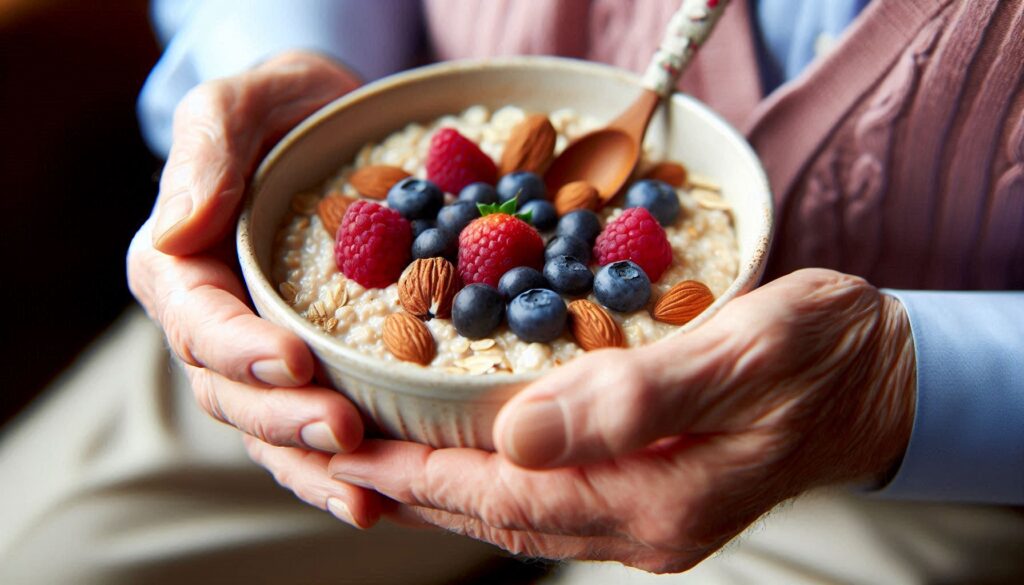
Article 14 of our Series “Nourishing Your Whole Self: The SaziBox Health Guide to Holistic Nutrition”
As we journey through life, our bodies undergo changes that impact our nutritional needs. While the concept of healthy eating remains constant, its nuances shift as we enter our golden years. Embracing a balanced and mindful approach to nutrition is key to maintaining health, vitality, and independence as we age.
The Importance of Nutrition in Senior Years
Healthy eating is not just about maintaining a healthy weight; it’s about providing your body with the essential nutrients it needs to function optimally, repair itself, and ward off chronic diseases. Seniors face unique challenges such as decreased appetite, changes in metabolism, and specific nutritional deficiencies, making conscious food choices even more crucial.
In this article, we’ll explore the four pillars of senior nutrition – bone health, cognitive function, digestive health, and appetite changes – offering practical tips and insights to empower you to age gracefully and healthfully.
1. Bone Health: Nurturing Your Framework

Age-related bone density loss is a common concern, increasing the risk of fractures and osteoporosis. Adequate calcium and vitamin D intake, along with regular exercise, are essential to maintain bone strength.
Top Nutrition Tips for Seniors: Bone Health
- Prioritize Calcium-Rich Foods:
- Dairy products: Milk, yogurt, cheese
- Leafy greens: Kale, spinach, collard greens
- Fortified foods: Orange juice, plant-based milk alternatives, cereals
- Other: Sardines, almonds, sesame seeds
- Get Enough Vitamin D:
- Sunlight exposure: Safe and moderate sun exposure can help your body produce vitamin D
- Fatty fish: Salmon, tuna, mackerel
- Fortified foods: Milk, some cereals, and orange juice
- Supplements: Talk to your doctor about supplementation if needed
Interactive Element:
- Bone Health Checklist: Answer a few quick questions to assess your bone health and see if you need to make any dietary or lifestyle changes.
Tip: Combine calcium-rich foods with vitamin D for optimal absorption.Tip: Engage in weight-bearing exercises like walking, dancing, or tai chi, which stimulate bone growth.Tip: Talk to your doctor about bone density screenings and any necessary supplements.
2. Cognitive Function: Feeding Your Brain

As we age, maintaining cognitive function and memory becomes increasingly important. Research suggests that a healthy diet can play a role in cognitive health and potentially reduce the risk of dementia.
Top Nutrition Tips for Seniors: Cognitive Function
- Include Fatty Fish: Aim to eat fatty fish like salmon, tuna, mackerel, or sardines at least twice a week.
- Snack on Nuts & Seeds: Enjoy a handful of walnuts, almonds, flaxseeds, or chia seeds daily.
- Embrace Berries: Incorporate blueberries, strawberries, or raspberries into your breakfast cereal, yogurt, or smoothies.
- Choose Whole Grains: Opt for brown rice, quinoa, and oats over refined grains.
- Eat Your Greens: Leafy greens like spinach and kale are packed with vitamins and minerals that support brain health.
Interactive Element:
- Brain-Boosting Recipes: Check out our collection of delicious and easy recipes packed with brain-healthy nutrients!
3. Digestive Health: Keeping Your Gut Happy

Digestive issues can become more common as we age, but a balanced diet and healthy lifestyle habits can help maintain gut health and prevent discomfort.
Top Nutrition Tips for Seniors: Digestive Health
- Boost Your Fiber Intake: Aim for at least 25-30 grams of fiber daily from fruits, vegetables, whole grains, legumes, nuts, and seeds.
- Stay Hydrated: Drink plenty of water throughout the day to prevent constipation and aid digestion.
- Include Probiotics: Incorporate probiotic-rich foods like yogurt, kefir, sauerkraut, kimchi, and kombucha to support a healthy gut microbiome.
Interactive Element:
- High-Fiber Smoothie Recipe: Download our delicious and easy-to-make high-fiber smoothie recipe to support your digestive health.
Tip: Chew your food thoroughly to aid digestion.Tip: Stay active and engage in regular physical activity to promote gut motility.Tip: Talk to your doctor about any persistent digestive issues.
4. Appetite Changes: Nourishing Despite Reduced Hunger

Many seniors experience a decrease in appetite, making it essential to prioritize nutrient-dense foods and make meals more appealing.
Read more
Top Nutrition Tips for Seniors: Managing Appetite Changes
- Eat Smaller, More Frequent Meals: Instead of three large meals, try eating five or six smaller meals throughout the day.
- Prioritize Nutrient-Dense Foods: Focus on foods packed with vitamins, minerals, and protein, like fruits, vegetables, lean protein sources, and whole grains.
- Choose Easy-to-Digest Foods: Opt for softer foods or those cooked until tender if chewing or swallowing is difficult. Soups, smoothies, and stews can be good options.
- Enhance Flavor: Use herbs, spices, and healthy fats to make your meals more appealing and stimulate your appetite.
- Make Mealtimes Social: Enjoy meals with loved ones or friends to make the experience more enjoyable.
Interactive Element:
Meal Planning Guide: Download our meal planning guide for seniors with reduced appetite, featuring easy-to-prepare, nutrient-dense recipes.
Embrace Healthy Eating for a Vibrant Future
Nutrition plays a crucial role in healthy aging. By following these nutrition tips for seniors and prioritizing bone health, cognitive function, digestive wellness, and adapting to appetite changes, seniors can thrive and enjoy their golden years to the fullest.
- Share your favorite healthy aging tips or recipes in the comments below!
- Don’t miss the next article in our “Nourishing Your Whole Self” series! Subscribe to our newsletter for more valuable insights and resources.
Remember, age is just a number. With mindful nutrition and lifestyle choices, you can maintain your health, vitality, and zest for life!




